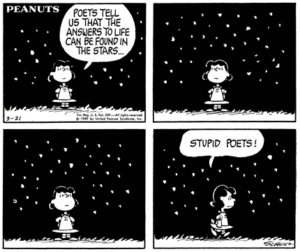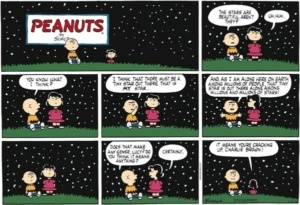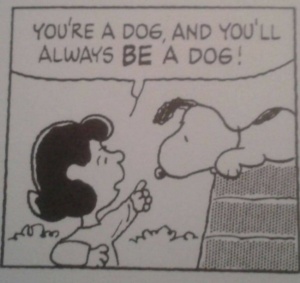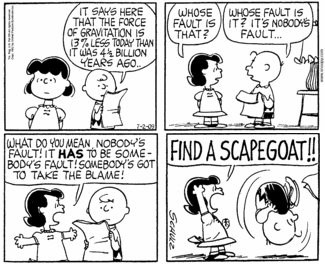Lucy is probably the most contemporary character in Peanuts. Normally this would mean that she represents contemporary thought and values. And she does. Just not particularly positive thought. In the Peanuts world there’s no happy ending. And there has to be someone at fault. As Charles Schulz commented in 1985:
‘…all the loves in the strip are unrequited; all the baseball games are lost; all the test scores are D-minuses; the Great Pumpkin never comes; and the football is always pulled away’
Lucy is the bastion of ‘Common Sense’, the go to call of every keyboard warrior these days. She would have loved the internet. Imagine her with a global platform for her pain and fury. She possesses a fragile psyche that screams ‘victim’ and looks for ‘scapegoats’ similar to that of the MAGA crowd and to multitudes on social media. She takes things to extreme. In a 1959 strip Charlie Brown tells her he’s lost a library book. She tells the neighbourhood he’s a thief. On November 20th 1969 for instance she wonders why it always rains when she wants to do something. Her brother Linus reasonably points out that this isn’t the case and that there’s been many sunny days. She then asks her brother in a very loud and threatening manner the question again. Cowed, he replies: ‘You’re a very unlucky person…’ The need to dominate and ignore logic is integral to communication on social media in particular.
It’s important to remember than Schulz based the Peanuts world on the viciousness and cruelty of children, recalling perhaps his encounters with bigger kids who bullied the younger or smaller ones. He disliked bullies and bullying intensely which makes it even stranger that the Peanuts world is brim-full of psychological and at times physical bullying, with the victim usually being Charlie Brown and the perpetrator Lucy. Violet and Patty often played the ‘Lucy’ role in their relationship with Charlie Brown in the comics first few years.
Suffering builds you up and prepares you for…more suffering. The characters (or even more devastatingly the children) are trapped in a perpetual cycle of self-loathing/crippling anxiety, unrequited love, intellectual failure and perpetual fury, continual defeat. Even the dog has given up on reality and hides in a WW1 day-dream in which he battles (but still loses) against the infamous Red Baron. And sometimes losing (and winning) isn’t enough:
 From 1969, we see Lucy, fed up with the lack of challenge Charlie Brown poses. Winning only means something when it has a value and meaning.
From 1969, we see Lucy, fed up with the lack of challenge Charlie Brown poses. Winning only means something when it has a value and meaning.
Beckett could have written all this. We can imagine Lucy et al on a stage with little backdrop to take our attention away from the violence of the words and occasionally the violence of the actions. Even when there is a backdrop it becomes part of the desolation as in when Sally befriends the school building. Schulz doesn’t let anything get in the way of the articulation of the characters psycho-dramas.
Of course whilst there are minimalist drawn backdrops the cartoons have layers of context. Lucy was not a stereotypical female figure, or even the ‘rebellious’ figure of the somewhat traditional ‘tomboy’ that could perhaps describe Peppermint Patty. Lucy was a pseudo-psychiatrist doling out dodgy advice to the unfortunate Charlie Brown. The famous psychiatry booth appeared for the first time, strangely not in the strip itself but on the back over of a reprinted compendium of strips called ‘You’re Out of Your Mind, Charlie Brown!’, published in February 1959. It appeared for the first time in the strip the following month:
 A depressed Charlie Brown asks her advice and the blunt reply is ‘Snap Out Of It!’ Useless advice perhaps but often the ‘common sense’ view from ‘the (wo)man in the street at the time and perhaps even now. Lucy can also be considered as emblematic of the monster that is public ‘common sense’ . Common sense has a ‘canon’ that all new things have to measure up to and inevitably few do so. In a strip we see Lucy ask Snoopy how he feels knowing that whatever he writes it ‘will never be as good as War and Peace?’ Nostalgia for a golden era and its golden things is a staple of this ‘common sense’ hence the multitude of middle-aged keyboard warriors inhabiting the online sphere. The abstract is another target of Lucy and her common sense brigade. In a 1969 cartoon (and long before Hitchhiker’s Guide To The Galaxy) Lucy wants to know the real answers to life. Linus does some calculations and come up with the answer ‘5’. Lucy punches him to the ground.
A depressed Charlie Brown asks her advice and the blunt reply is ‘Snap Out Of It!’ Useless advice perhaps but often the ‘common sense’ view from ‘the (wo)man in the street at the time and perhaps even now. Lucy can also be considered as emblematic of the monster that is public ‘common sense’ . Common sense has a ‘canon’ that all new things have to measure up to and inevitably few do so. In a strip we see Lucy ask Snoopy how he feels knowing that whatever he writes it ‘will never be as good as War and Peace?’ Nostalgia for a golden era and its golden things is a staple of this ‘common sense’ hence the multitude of middle-aged keyboard warriors inhabiting the online sphere. The abstract is another target of Lucy and her common sense brigade. In a 1969 cartoon (and long before Hitchhiker’s Guide To The Galaxy) Lucy wants to know the real answers to life. Linus does some calculations and come up with the answer ‘5’. Lucy punches him to the ground.
Schulz never considered his cartoons to be ‘fine art’ and no doubt the art establishment also wouldn’t have considered them as such. However Lucy as the arbiter of common sense and good taste was a useful conduit to poke fun at the critics:

‘Common sense’ is the catch-all used when people can’t or won’t articulate their prejudices. ‘Tradition’ and ‘Culture’ are other much misused terms. Common sense as a social/political device goes back a long way. Thomas Paine for instance declared that American independence from England was common sense and that it was a bulwark against tyranny though the term has been used by every dodgy politician and snake-oil seller since it was used first around the ‘Glorious Revolution in England. Lucy sees herself as the voice of the people, or more accurately the ‘common person’, ordinary but at the same time extraordinary and superior in this ordinariness. If she was in the Brexit or Covid debate we can almost imagine her denouncing experts. Rosenfield comments:
“In its current political form, ‘common sense’ is intended to telegraph two related messages: Ordinary people know better, especially compared with overeducated, smooth-talking experts and insiders. And governing works best when it is rooted in everyday experience.” [1]
In April 1959 Lucy declares that she believes in herself, she is the cause! She believes in the cause of good ol’ me! Homespun individualism at its best or worst.
As a slogan, a style of address and an ideal, common sense has long played an outsize role in American politics, typically surging in times of exceptional fractiousness. And for all its homespun appeal, it has often been a vehicle for precisely the opposite of what it suggests: subjectivity, partisanship and demagoguery. [2]
This ‘common sense’ is of course the enemy of creativity and imagination. Lucy as the famous phrase goes doesn’t know It allows no time for wonder or the sublime. In a classic Peanuts strip (below) Lucy condemns the poetic imagination:

Stars get a bit of a hard time from the girls in Peanuts. In another strip we see Sally wish upon a star for a pony and curse it when nothing of course appears. In perhaps a role reversal it is the male characters in Peanuts that take pleasure and solace from the night sky. In one strip Linus waits patiently for a star to appear and happily greets it with a ‘Hi!’ when it does. In another (below) we see Charlie Brown identify with a tiny star out there along among millions. Of course Lucy, the voice of common sense, questions his mental health:

The point that Schulz was making with Lucy is that yeah, she’s right, looking for answers in the stars is indeed stupid but overwhelming common sense like complete clarity and sobriety (as Terry Pratchett also observed) is as frightening and damaging as being lost in a daydream or looking for connections in beauty and the sublime. It hard to argue with ‘common sense’ views though hence their popularity with chancers and demagogues. As Lucy puts it bluntly:

Of course ‘common sense’ in inextricably linked to fear and the apocalyptic. ‘Good-advice’ comes with the fear of those that don’t measure up to what common-sense dictates. There’s another brilliant early strip that sees Snoopy dancing wilding, ignoring Lucy’s warnings of biblical disasters. Eventually she gives up in frustration as her declarations of doom are no use. Schulz used Snoopy to undermine notions of ‘common-sense’ in his interactions with Lucy. In a strip where we again see Snoopy dancing happily, Lucy grumpily informs him that if he knew how much sadness in the world he wouldn’t dance. He stops and she’s glad he’s come to his (common) senses. It turns out he’s stopped because his feet hurt. It’s a subtle but clever way to undermine the grand narrative that is common sense.
Schulz was to varying extents religious throughout his life and indeed Peanuts was popular with the American evangelical Right, particularly after A Charlie Brown Christmas aired on TV. However he had no time for bigots and fundamentalists. In the strip belong we see Lucy as the classic religious fundamentalist condemning the ‘sinner’ in this case Snoopy (again) with Schulz giving the dog the most childish but perfect response:

Lucy represents that clarity, that sense of purpose that disallows opposition or disagreement. The Catholic/Calvinist (to name but two culprits) gloomy fatalism that seeks to destroy the spontaneous, the fun, the imaginative. Live in dread and fear says Lucy. Be sensible…
Schulz rarely took aim at religion directly but on occasion used Lucy (and occasionally Snoopy) in particular as a cypher to critique it. ‘Her Kind Deserves To Be Bleahed’ indeed. Theological certainty in the shape of fundamentalism was attacked unusually directly in the strip below:

‘Common sense’ is of course used to keep people in their place. A vehicle by which change is challenged and the status quo maintained:

Lucy, like many of the Peanuts characters is a contradiction. She believes in feminism, the advancement of women etc., but she is also a jerk. She mainly concentrates on the advancement of herself and if this breaks the glass ceiling for other women fine, she’ll get the plaudits. She’s not one dimensional and as Jean Schulz commented: ‘Why can’t she be both a feminist and a jerk?’

Hallmark, the US toy/souvenir company recently released one of the most frightening of Peanuts related merchandise (above) Lucy in her ‘common sense patrol’. It’s a weird mash of the cute and the totalitarian and of course fits into the current era, perfectly echoing such ridiculous (but sadly real) outfits like Afghanistan and Iran’s morality police. There’s even a bright red flashing light on the bonnet. Nuance isn’t a part of this toy’s world. All shades of grey have been replaces with an overarching common-sense. As has been pointed out:
A major part of the rhetorical value of common sense is that it allows listeners to engage in attribute substitution. This process occurs when an individual replaces a difficult question with an easier one. Many of the situations where speakers invoke common sense are nuanced and difficult to resolve, but people can easily decide that they don’t want to oppose common sense. Thus, by allowing people to make that substitution, speakers can rouse support for an otherwise contentious position.
The phrase also gains rhetorical strength through the bandwagon effect, a phenomenon where people become more likely to accept a belief if they think other people have already accepted it. By calling a position common sense, politicians create a bandwagon, even when the policy does not actually have popular support. Nevertheless, by framing a position as common sense, people will be more likely to believe the policy is a shared perception about the world and change their own opinions accordingly. [3]
Lucy has a weakness in her common sense armour however, though not arguably in her being-a-jerk-ness. She is in love with Schroder, that Beethoven loving toy piano prodigy. Not just a crush but an all-consuming obsession with him that would probably be classed as stalking or even sexual harassment in contemporary times. He is an object for her to possess and she bothers him continually, sitting at the edge of his piano. She has little or no interest in the music he plays and is openly contemptuous of his hero Beethoven, not even convincing when she pretends to have an interest in the composer. Indeed she has even tried to destroy his piano, emasculating him from his true love, music.
Schroder, it’s fair to say is probably the least developed or complex of the Peanuts characters, He is essentially his music. It might be a little too much to claim, as Wong does, that his (non) relationship with Lucy is the most interesting thing about him but it’s not that far off the mark. He represents the traditional and perhaps somewhat clichéd obsessiveness of the artist. Everything, including or especially Lucy is secondary to his craft, even if it is only a toy piano he plays. [4]
He’s also emotionally cold when Lucy is there but when she suddenly (if temporarily) moves away Schulz riffs off Pygmalion/My Fair Lady:
 He complains to Charlie Brown that he never even got to say goodbye to her and is told coldly to go back to his piano as he never liked her anyway. Inevitably Lucy returns and he goes back to being distant and occasionally disgusted by her. In fact in a 1972 strip he tells her directly he doesn’t love her. Schulz never was very kind to his characters so in a 1984 strip Schroder, delighted that Lucy has remembered Beethoven’s birthday kisses her on the cheek. Unfortunately Lucy thinks Snoopy kissed her and runs away screaming.
He complains to Charlie Brown that he never even got to say goodbye to her and is told coldly to go back to his piano as he never liked her anyway. Inevitably Lucy returns and he goes back to being distant and occasionally disgusted by her. In fact in a 1972 strip he tells her directly he doesn’t love her. Schulz never was very kind to his characters so in a 1984 strip Schroder, delighted that Lucy has remembered Beethoven’s birthday kisses her on the cheek. Unfortunately Lucy thinks Snoopy kissed her and runs away screaming.
 Lucy as was stated at the beginning of this essay is the most contemporary of Schulz’s characters. The one that could adapt most readily to our ever-connected internet world. She’d still be angry, still be a bit of a jerk but she’d be in her element. Our modern age has so much to be furious about, so little ‘common sense’. So many people to be put in their place.
Lucy as was stated at the beginning of this essay is the most contemporary of Schulz’s characters. The one that could adapt most readily to our ever-connected internet world. She’d still be angry, still be a bit of a jerk but she’d be in her element. Our modern age has so much to be furious about, so little ‘common sense’. So many people to be put in their place.
Notes
[1] https://www.washingtonpost.com/opinions/beware-of-republicans-bearing-common-sense/2011/04/19/AFv0CiJE_story.html
[2] Ibid
[3] https://medium.com/@danmcgee/the-myth-of-common-sense-needs-to-die-ce6815ca4977
[4] https://kotaku.com/how-peanuts-used-lucy-and-schroeder-to-explore-dysfunct-1825694862
Thanks to the Arts Council Of Northern Ireland for funding this essay.

